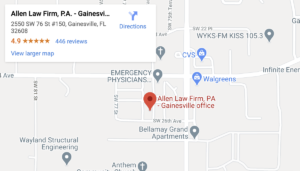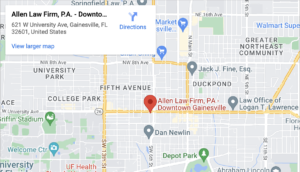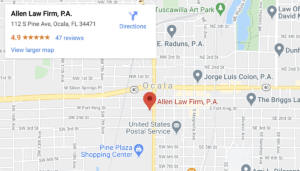Florida Child Car Seat Laws

You can’t always prevent a car accident. You can, however, take steps to keep your children as safe as possible if an accident happens. Like other states, Florida has specific rules regarding the use of child car seats.
If you’re interested in learning more about the Florida child car seat laws and how they might impact your right to compensation if you’re hurt in a crash, call Allen Law Accident & Injury Lawyers today. We offer a free consultation so that you can get the legal advice you need.
Overview of Florida’s Child Car Seat Laws
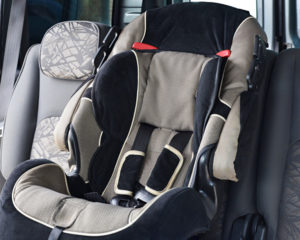
Florida’s child car seat laws are spelled out in Section 316.613 of the motor vehicle laws. Generally, every child under the age of six must be restrained in a crash-tested, federally-approved car seat regardless of where they’re sitting in the vehicle.
The specific requirements vary depending upon the child’s age, as follows:
- Children aged 0-3 must be restrained in a separate carrier or a vehicle manufacturer’s integrated child seat
- Children aged 4-5, a separate carrier, integrated car seat, or booster seat can be used
The Florida Department of Highway Safety and Motor Vehicles recommendations state that children should remain in the rear seats of the car until at least age 12.
Florida Seat Belt Laws for Children Under Age 18
The Florida Safety Belt Law requires children under 18 to wear a seat belt if they’re sitting in the front seat of a motor vehicle. Children riding in the front seat must always wear a seat belt, regardless of whether the child is driving or riding as a passenger.
Are the Child’s Height and Weight Relevant in Finding the Safest Car Seat?
Florida law doesn’t provide specific rules about the child’s height and weight. Only the child’s age is relevant to whether you’ll receive a ticket for a violation.
However, the child’s height and weight do matter if you want to maximize child passenger safety. The American Academy of Pediatrics (AAP) has released a list of “best practices” that you can use to select the child restraint devices most likely to help in a car accident.
AAP best practices include:
- Infants and toddlers should be placed in rear-facing seats for as long as possible, at least until they reach the height and weight specified by the car child seat manufacturer
- Once the child outgrows the rear-facing car seat, the toddler should be placed in a forward-facing child safety seat with a harness for as long as possible
- Once the child exceeds height and weight limits for the forward-facing seat, a belt-positioning booster seat should be used until the standard seat belt fits (typically until age 8-12)
Children who are using the standard seat belts should be supervised so that they use both the lap and shoulder belts.
The height and weight specified on the car seat you have purchased are important. Some children grow more quickly than others. It’s important to obey Florida child car seat regulations. However, your child might be safest remaining in a more restrictive car seat based on his or her own size.
What Are the Penalties for Violating Florida’s Child Car Seat Laws?
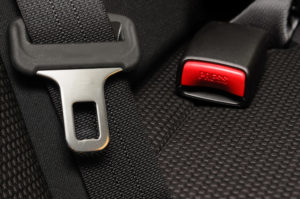
Violating the child car seat laws is considered a moving violation. If you’re ticketed, three points will be assessed against your driving record. The fine for the ticket itself is $60. However, because three points will be put on your record, your insurance rates could also increase.
You may be able to avoid having points added to your record if you complete a court-approved child restraint safety program. Courts have the discretion to waive otherwise applicable penalties. The course itself must be approved by the court and the Department of Highway Safety and Motor Vehicles.
Violation of the Florida child safety belt law is a $30 fine, plus any other applicable penalties that may apply.
Law enforcement in Florida doesn’t make exceptions if you’re visiting Florida from another state. Failure to follow the child car seat laws can subject you to the same penalties that Florida residents face.
Are There Any Situations Where the Child Car Seat Laws Don’t Apply?
Florida law requires parents to follow the child car seat laws when transporting their own children in a traditional motor vehicle. There are, however, exceptions to the rule. The child car seat laws don’t apply if the vehicle is a:
- School bus
- Commercial bus
- Piece of farm equipment
- Motorcycle
- Bicycle
- Moped
- Large truck that weighs more than 26,000 pounds
Florida also provides exceptions to the booster seat law for children who are four and five years of age. If you’re a parent or a member of the child’s immediate family, the law always applies. If you’re a friend who is giving the child a ride as a favor, the booster seat requirement doesn’t apply. If you receive any type of payment for the ride, however, the law does apply.
Following Florida’s Child Car Seat Laws Can Prevent Serious Injuries
The Florida child car seat laws are designed to prevent serious injuries in a car accident. Children are small and much more likely to sustain a severe injury if unrestrained in a crash. Proper use of a car seat can prevent:
- Traumatic brain injuries
- Head and neck injuries
- Concussions
- Whiplash
- Spinal cord injuries
- Back injuries
- Internal organ damage
- Chest injuries
- Soft tissue damage
- Broken bones
- Paralysis
- Catastrophic injuries
- Wrongful death
Airbags and other vehicle safety devices are less effective in protecting young children. Some might even create a greater risk of serious injury. To keep your child as safe as possible, pay close attention to both Florida regulations and the manufacturer’s recommendations for your particular child car seat.
Common car accidents in Gainesville include:
How Do I Choose the Right Car Seat to Protect My Child?
It’s important to follow the law. Unfortunately, the letter of the law in Florida provides very few details about how to maximize your child’s safety when riding in a motor vehicle.
The National Highway Traffic Safety Administration (NHTSA) provides much more detailed guidance on choosing the right car seat, installing it properly, and keeping your child safe over time. NHTSA recommends that parents:
- Consider the child’s age and size when selecting the car seat
- Make sure the car seat fits properly in the particular vehicle
- Check the manufacturer’s height and weight limits
- Follow all manufacturer specifications
NHTSA also provides information on installing various types of car seats properly. Importantly, parents have the option of registering their car seat with the manufacturer. Registration ensures that you’ll receive a notification if the manufacturer recalls the car seat for safety reasons.
Can Failing to Use a Child Seat Impact My Right to Compensation After a Car Accident in Gainesville?
In most cases, the modified comparative fault rule in Florida can be used to reduce an accident victim’s compensation award if the victim’s actions also caused the crash. Evidence of how each party’s actions contributed to the injuries is usually relevant in assigning blame. Florida also has a 51% bar to recovery rule in place, so accident victims cannot recover compensation if they are mostly at fault for their injuries.
The Florida child car seat laws provide an exception when it comes to failing to use a child car seat. Failure to use proper child restraints is not considered comparative negligence. Evidence about the failure to use a child car seat can’t be admitted as evidence at trial.
That means lawyers and insurance companies can’t try to use it against you if you were in a car accident and your child wasn’t in a car seat.
Evidence of the fact that a child under the age of 18 violated the seat belt law can be used to establish comparative negligence. If your child was not yet 18 and was hurt in a crash without a seat belt, usual Florida shared fault rules apply.
How Can An Attorney Help if My Child Was Hurt in a Car Accident in Florida?
You do everything you can to protect your children. Still, car accidents happen. Your child could be injured even if you followed the child car seat laws in Florida precisely.
At Allen Law Accident & Injury Lawyers, our experienced Gainesville personal injury lawyers are here to provide advice about preventing injuries and accidents. We can also help if you’ve already experienced a crash.
Insurance companies will try to blame you for the crash. They might claim your child had outgrown the car seat or that the seat was improperly installed. We can defend your rights and help you understand Florida’s shared fault rules.
Our lawyers can also help you determine whether a flaw with the car seat itself caused your child’s injuries. If the car seat was defective, we can file a product liability lawsuit against the manufacturer.
Call Our Experienced Gainesville Car Wreck Attorneys to Learn More About the Florida Child Car Seat Laws
Learning the Florida child car seat laws can help parents avoid legal trouble. Following applicable guidelines can also keep your child as safe as possible if you’re in a crash.
At Allen Law Accident & Injury Lawyers, our lawyers have over 20 years of experience protecting accident victims’ rights in Central Florida. If you or your child were hurt in a car accident, give us a call to our law offices to schedule a free consultation today. We’re also here to help if you just want to learn more about the laws here in Florida.


